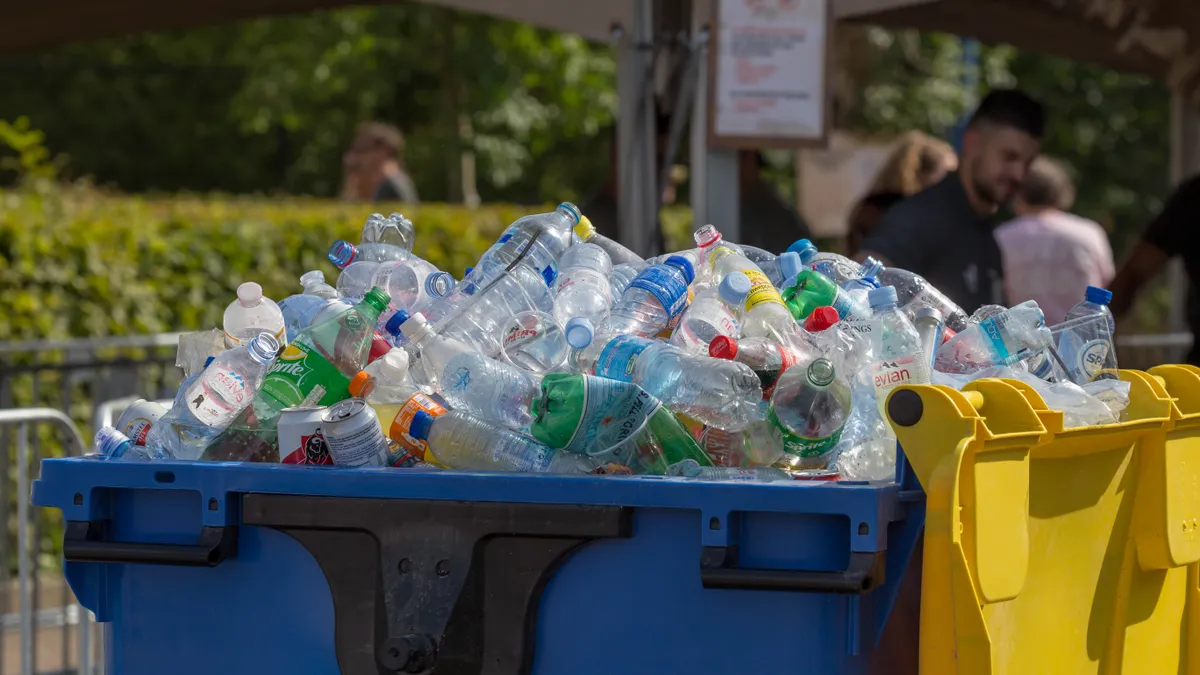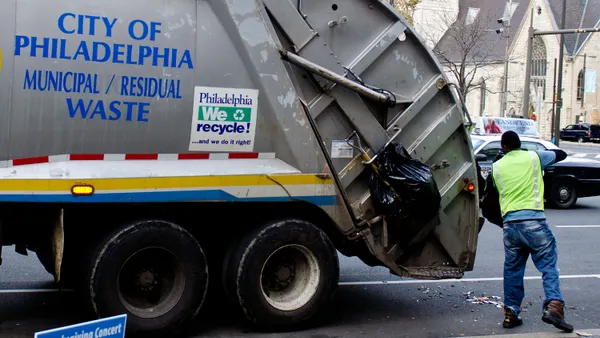Dive Brief:
- New Jersey's recycled content bill, SB 2515, will be overhauled after an extensive meeting between lawmakers and the state's Department of Environmental Protection (DEP). Backers now aim to introduce a substitute bill by the next state Senate Energy and Environment Committee meeting in December, likely moving final action into 2021.
- Sen. Bob Smith, committee chair and primary bill sponsor, said during a Monday hearing the new legislation will be "much more towards the California model than the way we started." It would establish a 25% recycled content standards for rigid plastic containers (previously 35%) and a 15% standard for plastic beverage containers (previously 10%). Starting one year after the bill's effective date, those levels would increase by 5% every three years until capping at 50%.
- Support for recycled content minimums is rising in the waste industry and an initial version of the bill drew support from players like the Institute of Scrap Recycling Industries. Association of New Jersey Recyclers (ANJR) Executive Director Marie Kruzan said she expected the substitute bill will address some pushback around issues like timeline and collection limitations.
Dive Insight:
Momentum around minimum recycled content standards is accelerating at the state level, with increasing support from the waste and recycling industry.
Last month, California Gov. Gavin Newsom signed AB 793 into law, making the state the first to enact recycled content minimums for plastic beverage containers. That law requires 50% recycled content by 2030 for relevant plastic containers, while preemptively barring similar local ordinances. This came after prior attempts were vetoed in California and Washington.
At the time of the California law's passage, supporters said they would like to see similar efforts in Northeastern states, including New Jersey. But reception to Sen. Smith's initial bill has been mixed, according to reporting by Plastics News. Environmental groups and recycling organizations are largely supportive of the legislation, but players in the manufacturing and packaging industries have said it would put an outsized burden on their sectors.
During the hearing, Smith said the new substitute proposal would account for some of the feedback offered by industry stakeholders and DEP officials. The new version includes 28 amendments, although recycled content standards for glass containers, paper carryout bags, plastic film bags, and plastic trash bags would be unchanged, and polystyrene loose fill packaging would still be prohibited. The state legislature recently passed a related ban on some of these items.
While the new bill's text is not yet available, Smith listed a number of alterations including a mechanism through which DEP can adjust the recycled content standards through regulation. The new bill will also include a narrower set of exemptions from the standards for rigid plastic containers. Moreover, waivers would apply only for manufacturers able to submit documentation from a recognized, certified third-party expert or from a relevant agency.
Kruzan of AJNR wanted the bill to ultimately pass, but said she could offer few substantive comments until the text is formalized. She welcomed some changes, including the emphasis on third-party certifications.
"That's a good way to give people some confidence," she said, echoing others in stating how the bill is now more similar to the California law. Those similarities could make adaptation easier for manufacturers, Kruzan said, as they can seek to meet similar goals in multiple states.
Kara Pochiro, vice president of communications for the Association of Plastic Recyclers, similarly could not comment in detail on the changes but noted her organization has a history of supporting mandated recycled content standards. "We are excited about the progress being made," she said via email.
Recycled content mandates also have broader support from the recycling industry. The National Waste & Recycling Association has increasingly embraced such policies, stating they create market incentives and help balance supply and demand.
Industry giants Waste Management and Republic Services are also supportive. At a Tuesday keynote session of the Northeast Recycling Coalition's virtual 2020 conference, Waste Management Senior Director of Sustainability and Policy Susan Robinson said recycled content minimums are "absolutely fundamental to the future and sustainability of recycling." She added new legislation will help that process.
Pete Keller, vice president of recycling and sustainability for Republic, expressed similar thoughts. "It's our belief that a minimum content standard with enforcement will cause more demand," he said.










